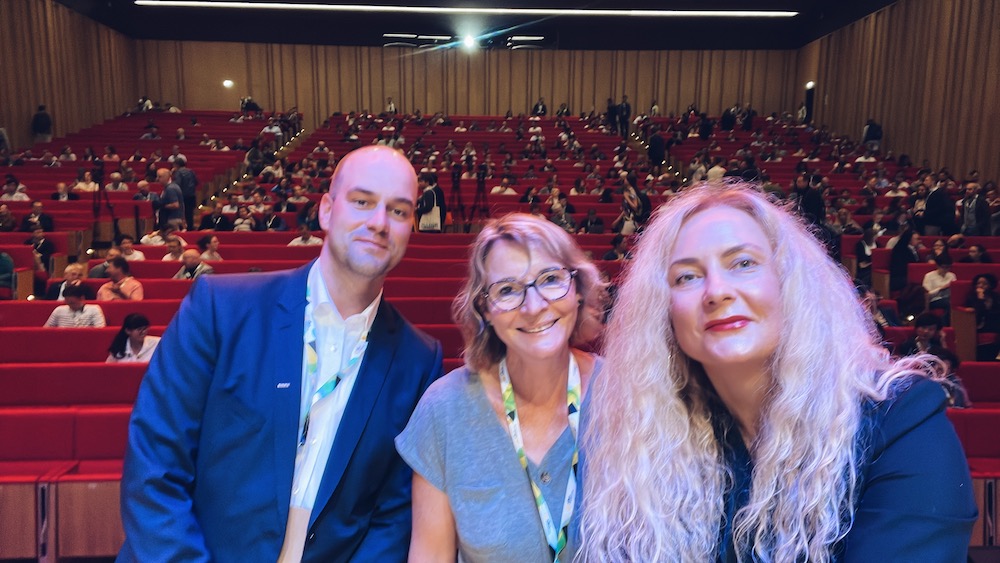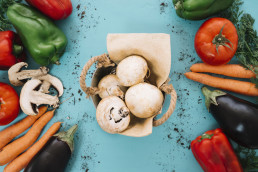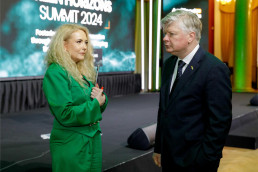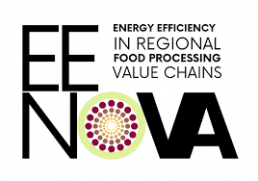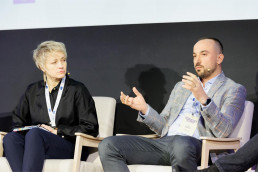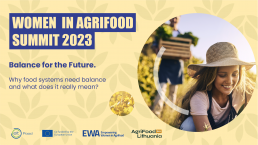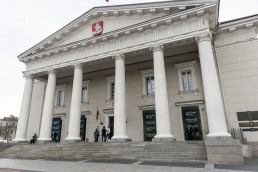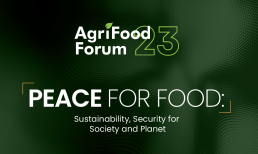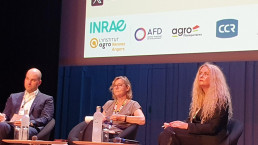SOULFOOD
The SOULFOOD project aims to test cutting-edge digital tools in the agrifood sector to foster sustainable production and enhance the connection between producers and social food distribution initiatives. It focuses on testing how to avoid food loss and waste in primary production by reusing it for vulnerable groups.
Through its efforts to build a more sustainable, inclusive, and interconnected agri-food value chain, SOULFOOD aligns with the global objective of halving food waste by 2030, while also addressing the pressing issue of inadequate access to nutritious meals among vulnerable populations. All activities of the project fosters collaboration between various stakeholders, including agri-food actors and social food distribution initiatives, spanning non-profit organizations and local governments. Also, dissemination and awareness-raising events will also be organised to share the results with similar actors in other European and non-European
countries.
With nine partners from four European countries – Spain, Lithuania, Romania, and Greece – representing diverse sectors of the agri-food value chain, including local governments, producers, digitalization and innovation experts, and social gleaning initiatives, SOULFOOD is poised to drive positive change in sustainable food production and consumption practices.
Project coordinator:
1. Diputacio de Tarragona (ES)
Project partners:
2. Lietuvos inovacijų centras (LT)
3. Agrifood Lithuania DIH (LT)
4. Cluster TIC Catalunya Sud (ES)
5. Fundacio Espigoladors (ES)
6. Reus Desenvolupament Economic SA (ES)
7. Ajuntament de Reus (ES)
8. Municipiul Roman (RO)
9. Boroume Saving Food Saving Lives (EL)
Contacts:
Chief operating officer Edita
edita@agrifood.lt
+37067780507
Project manager Irmantas
irmantas@agrifood.lt
+37068562766
The image was designed by Freepik
EENOVA: Energy Efficiency in regioNal fOod Processing Value chAins
EENOVA: Energy Efficiency in regioNal fOod Processing Value chAins (Reference: LIFE22-CET-EENOVA/101119476 | Acronym: LIFE22-CET-EENOVA) Project Summary:
EENOVA is dedicated to addressing the key challenges associated with the food chain’s heavy reliance on fossil fuels. Our primary objectives revolve around promoting energy-efficient solutions, evaluating and enhancing energy efficiency, increasing the use of renewable energy sources, and simultaneously reducing the carbon footprint within five regional value chains spanning five distinct food processing subsectors and countries. These value chains and their respective locations are as follows:
- Bakery – Austria (AT)
- Meat – Romania (RO)
- Water and soft drinks – Lithuania (LT)
- Winery – Bulgaria (BG)
- Dairy – Slovenia (SI)
EENOVA’s overarching goal is to guide businesses operating within these value chains towards the realisation and implementation of tailored energy-related improvements.
Our methodology revolves around harnessing the unique regional characteristics of these value chains, primarily consisting of small and medium-sized enterprises (SMEs) and larger enterprises (LEs). We achieve this by identifying common steps that promote awareness, collaboration, and the effective implementation of energy-efficient practices among individual companies belonging to specific food processing value chains. This focus on individual and interrelated conditions within the value chains takes into account the regional variations in legislation, standardisation, and business environments.
The expected energy-related impact of our intervention is significant.
Drawing on the successes of our five case studies, EENOVA will develop an adaptable replication model that can be applied to other value chains within the same or different regions and sectors. The adoption of this model will be facilitated through the active involvement of key stakeholders, including sector associations and representatives from the finance sector.
Furthermore, our project partners collaborate closely to identify innovative solutions that encompass technological enhancements, sustainable business
models, and necessary policy measures. This collaboration is intended to bolster the food processing subsectors, enabling them to embrace energy-efficient practices and become energy-smart.
Coordinator: ConPlusUltra (CPU)
Contact person: Harald Grill
Email: harald.grill@conplusultra.com
List of Partners:
- Conplusultra Gmbh
- Business Upper Austria – Oo Wirtschaftsagentur Gmbh
- Energy Efficiency In Industrial Processes Asbl
- Kliynteh Bulgaria
- Agrifood Lithuania Dih
- Asociatia Clusterul Agro-Food-Ind Napoca
- Univerza V Ljubljani
- Inovacijsko-Razvojni Institut Univerze V Ljubljani
Co-funded by the European Union. Views and opinions expressed are however those of the author(s) only and do not necessarily reflect those of the European Union or CINEA. Neither the European Union nor the granting authority can be held responsible for them.
EENOVA WEBSITE: https://eenova-project.eu/
Twitter/X: @EENOVA_Project
LinkedIn: EENOVALink to EENOVA website (upcoming)
Balancing the future: Women in AgriFood Summit 2023 in Lithuania will approach critical global issues
The urgent challenges affecting our world and the agrifood industry will be addressed at the Women in Agrifood Summit in 2023. As a summarizing event of the 4th edition of the EIT Food Empowering Women in Agrifood (EWA) programme, it is being hosted by AgriFood Lithuania DIH on December 1 in Vilnius, Lithuania. The aim is to make the summit a platform for fruitful discussion on gender equality advocacy and building an inclusive, safe, and sustainable agrifood system.
The agrifood sector is closely linked to the critical challenges our planet is currently confronting. Encouraging innovation and fostering inclusivity are essential steps toward building a resilient and secure agrifood system that benefits everyone. Due to this, the theme of this year’s summit is “Balance for the Future: Why Food Systems Need Balance and What Does It Really Mean?”. EIT Food is supported by the European Institute of Innovation and Technology (EIT), a body of the European Union.
Malgorzata Druciarek, Gender and Diversity Officer at EIT Food CLC North-East stated: “Gender equality is a crucial thing to fortifying the growth, resilience, and sustainability of the agrifood industry. The Women in Agrifood Summit is not only a summarizing event of the 4th edition of the EWA programme but also an important platform where numerous experts will undertake important discussions on the cooperation of women and men in the process of transforming the sector. We are very proud of our role as a driving force behind the event that echoes our belief in an inclusive and prosperous future for all within the agrifood sector.”
The event will gather participants of the EWA programme which took place this year in 11 European countries: Poland, Estonia, Ukraine, Serbia, Slovenia, Greece, Italy, Portugal, Spain, Turkey, and Romania. All women with an interest in agriculture, food, technology, and business will have the chance to network, share experiences, realize their own potential, and more.
Many experts in their field and managers will be among the speakers, who will engage in critical debates about how men and women can work together to change the business for the better in the future.
Additionally, on-site attendees will have the chance to actively participate in workshops led by exceptional moderators who will motivate audiences to discuss the current difficulties facing the agrifood sector.
CEO of AgriFood Lithuania DIH Kristina Šermukšnytė Alešiūnienė, an expert in the field and a patron of the Lithuanian EWA programme, expressed her support for this initiative: “Its mission to nurture gender balance is both commendable and greatly needed in today’s world, where diversity and equality are crucial for progress. Over the past four years, the programme has raised many talented female entrepreneurs, and Lithuania has also achieved great results. For us, it is an honor to organize the summit of its kind for the first time here in Vilnius.”
For more information about the Women in AgriFood Summit 2023 and to register for this event, please visit the official website: https://womeninagrifoodsummit2023.eu/.
AgriFood Forum 2023 evolves, with a special guest opening the event for the first time
Vilnius will soon once again become a platform for thoughtful solutions to address the complex challenges facing the planet in the long term and develop global partnerships that enable more effective and innovative transformation. The annual International AgriFood Forum 2023 is back on November 14. The largest event of its kind in the Baltics brings together political, business, and academic leaders from all over the world, and this year's participants include European Commissioner for Agriculture Janusz Wojciechowski. The event is available to attend for free and will be streamed online by registering on the official website www.digitalfarm.lt.
The forum on the theme "Peace for Food: Sustainability, Security for Society, and Planet" is organized by the AgriFood Lithuania cluster and digital innovation hub and the European Parliament, in cooperation with "Business at OECD" and the Lithuanian Confederation of Industrialists.
In line with the mission of an impactful organization
The previous forum attracted more than 2,500 online listeners. This year, an even larger audience is expected due to the wide range of topics covered, and the event will bring together up to 200 guests live at Vilnius Town Hall.
Other major international events around the same date as the AgriFood Forum 2023 will provide even more opportunities to exchange important insights. On the day before the forum, the official meeting of the "Business at OECD" Food and Agriculture Committee will take place at the Palace of the Grand Dukes of Lithuania for the first time. Usually, such meetings are held at the organization's headquarters in Paris.
On November 14-15, a unique coworking space for the interactive "C2Lab" workshop, initiated by the European Clusters Alliance, will be set up. Organizations from different industry clusters, companies, and research institutions from all over Europe will come together in consortia to develop business ideas.
"Business at OECD" is an international business group that has formally represented the private sector in all aspects of OECD policy-making for more than 60 years. Simply put, it is a partner in major decisions, facilitating the dialogue between business and government toward a growth-oriented, prosperous, and inclusive future.
The forum concept, launched last year, is further developed through one of the organization's global initiatives, "Peace for Food". It highlights the commitment of business to the global goals of agricultural sustainability and innovation, invites countries to focus on current food markets and their challenges, and supports companies that have the ambition to engage proactively in the OECD's work on agriculture.
The Commissioner for Agriculture will open the forum
Since 2019, the event has been characterized by outstanding visits from speakers and panelists, including high-level government officials, representatives of agriculture and/or food and other businesses and clusters, academics, and agri-food value chain stakeholders at international and national levels.
The 5th AgriFood Forum, whose detailed programme and list of speakers are available on the above-mentioned official website, will have a very special guest. In addition to the Speaker of the Seimas, Viktorija Čmilytė-Nielsen, and the Minister for the Environment, Simonas Gentvilas, the forum will be opened by the European Commissioner for Agriculture, Janusz Wojciechowski.
The EC representative's vision for the future of the sector aligns with the main topics to be addressed at the AgriFood Forum 2023, starting with modernization and sustainable agriculture that can adapt to climate, demographic, and technological challenges. Mr. Wojciechowski's priorities include contributing to the implementation of the Field-to-Table approach for sustainable, healthy, quality food, promoting cooperation between Member States in the development of strategic plans reflecting EU and national priorities, focusing on regional areas, organic farming, zero pollution, etc.
Networks hold the golden key to transformation
Reflecting on the importance of the forum's continuity in addressing complex food system crises and finding the tools needed to tackle them, the organizers also recall a key message that has been encoded in many of the AgriFood Forum 2022's speeches and panel discussions.
Today, the power to change the world by initiating and implementing change lies in networks based on close partnerships: clusters, digital innovation hubs, business initiatives, large corporations, and other cores of the agri-food system that are threatened by the same sectoral problems. However, despite the differences between countries and even continents, they share a common "enemy": the pollution of the planet, the shrinking of food chains, or the lack of regional development and investment in small and medium-sized businesses.
Thus, last year's consensus led to an even stronger commitment, not only to maintain but also to continuously reinforce the capacity of a powerful network made up of smaller ones. This year's forum community is ready to demonstrate the results of the agreement. Global organizations such as the European Clusters Alliance, which brings together more than 900 clusters, and "Business at OECD" will continue to tackle the turbulence of recent times, including COVID-19, geopolitical shocks, and extreme climate change.
It is worth mentioning some of the other important networks that will provide insights at AgriFood Forum 2023: the pan-European consortium EIT Food, which promotes entrepreneurship and innovation in the food sector; Smart Sensors 4 Agri-food, which is supporting agri-food companies on their digitalization journey based on the expertise of more than 40 partners in different regions and countries; the Global Dairy Platform; and the International Seed Federation.
A future secured as a result of today's joint efforts
Vidmantas Janulevičius, President of the Lithuanian Confederation of Industrialists, points out that the EU is not merely identifying the agri-food sector as one of the 14 industrial ecosystems that have a special role to play in the ongoing transformation. According to the expert, it is a powerful industry that contributes not only to national GDP but also to European and global growth.
One of the forum's speakers highlights the importance of cooperation in achieving the desired outcomes by saying: "Beyond the financial indicators, the agri-food industry undoubtedly contributes to vital aspects of social stability and global health. To achieve such a model for a sustainable future, it is time to build clear policies based on research findings and to consult the industry to realize more value-added solutions. From innovations that fundamentally change farming practices to more efficient, greener production processes and energy independence as recommended by the EU".
Augustas Alešiūnas, AgTech business angel and founder of the agri-food innovation house ART21, who participated in the very first AgriFood Forum, echoes the insight about the positive transformation of the event that has become a tradition.
"Increasingly constructive, pragmatic discussions between key opinion makers in the sector are opening up a global perspective on the planet's values, the fragility of which is largely the responsibility of us—humanity. I am delighted that each year we take a deeper and broader look at the event, covering land, forests, water resources, biodiversity, the interconnections between food systems and public health, and more. It seems that policymaking for the future is no longer a buzzword but a roadmap of real and achievable actions on how we should change our behavior and what concrete choices we should make to maximize the benefits for the planet," the expert comments.
"Agrifood Forum 2023 is back: register now!
“AgriFood Lithuania and the European Parliament, in cooperation with the Business and Industry Advisory Committee of the Organisation for Economic Co-operation and Development (Business at OECD) and the Lithuanian Confederation of Industrialists (LICCI), will present a new report. On 14 November, the European Union and the Confederation of Lithuanian Industry and Confederation of Commerce and Industry (CFI) are organising the annual international Agri-Food Forum 2023 at Vilnius Town Hall. This is the largest agri-food forum in the Baltic States, bringing together political, business and scientific leaders from across Europe. Last year, the Forum was watched online by more than 2 500 unique viewers.
The Forum will focus on ensuring food security and sustainability in the context of the global food and agriculture crisis. Global challenges such as the consequences of the COVID-19 pan-epidemic, climate change, the aftermath of Russia’s invasion of Ukraine, as well as the increased cost of energy and fertilisers are disrupting supply chains and putting pressure on the markets. It is therefore crucial to promote cooperation between the public, private and non-governmental sectors. Inter-sectoral and inter-institutional cooperation would ensure long-term and sustainable solutions for the stability and sustainable development of the agri-food sector.
The main theme of this year’s Forum is “Food for Peace: Sustainability, Security for Society and the Planet”.
The event will also host the interactive workshop “C2Lab” on 14-15 November – a unique co-working space where organisations from various industry clusters, companies, research organisations from all over Europe will form consortia and develop business ideas together. The focus here will be on cross-sectoral collaboration, tackling challenges in the agro-food, forestry sectors and cross-cutting themes that include skills, networking and innovation.
Hurry up and book your place at the biggest annual international event!
The XVII Congress of the European Association of Agricultural Economists addressed digital innovation and the Green Deal
The XVII Congress of the European Association of Agricultural Economists addressed digital innovation and the Green Deal
Climate change has a direct impact on the agri-food sector. The challenges it poses were discussed at the XVII Congress of the European Association of Agricultural Economists (EAAE) in Rennes, France, last week, from August 31 to September 1.
The main topic of the conference, “Agri-food systems in a changing world: Connecting science and society”, reflects the aim of finding solutions to transform agri-food systems into more sustainable, resilient, and planet-efficient ones, combining scientific and innovative progress.
Famous professors and leaders of international organisations from the United States, Switzerland, Germany, Switzerland, France, the Netherlands, and Germany shared their insights: Marion Jansen, Director of the Trade and Agriculture Directorate of the OECD, Robert Finger, Professor of Agricultural Economics and Policy at ETH Zurich, Thomas Heckelei, Professor of Economic and Agricultural Policy at the University of Bonn, Thomas Jayne, Professor of Agricultural, Food, and Resource Economics at the University of Michigan State, David Just, Professor and Director in Science and Business in the Charles H. Dyson School of Applied Economics and Management at Cornell University, Miranda Meuwissen, Professor of Risk Management and Resilience in Food Supply Chains at the Business Economics Group, University of Wageningen, Professor of Risk Management and Resilience in Food Supply Chains at the Business Economics Group at Wageningen University, and Jutta Roosen, Professor of Marketing and Consumer Research at the Technical University of Munich.
Kristina Šermukšnytė-Alešiūnienė, CEO of the Cluster and Digital Innovation Hub “AgriFood Lithuania DIH”, was the only business representative who gave one of the keynote speeches at this annual high-level congress.
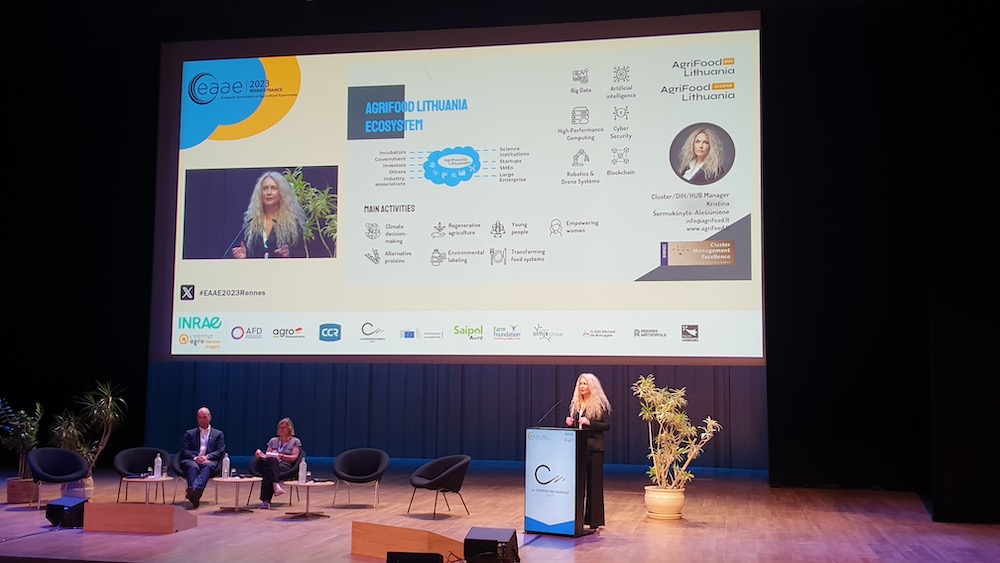
In the panel discussion “Digital Innovations for Sustainable and Resilient Agricultural Systems”, Kristina, from the perspective of the European Cluster Leader of the Year and a long-standing expert in the agri-food sector, delved deeper into the region’s digital innovation and greening situation, challenges, opportunities, good practices, and other related aspects in her speech “The Digitization and Greening of the European Agri-food Industry”.
The main points expressed include:
- Digitalisation improves business processes by reducing costs, increasing productivity, reducing risks, increasing traceability, and promoting sustainability.
- Innovation through E-SIC by offering technical expertise and experimentation (i.e. testing before investing) reduces the risks of adopting new technologies and helps to discover the right ones. Take the opportunity to become a member of EDIHLT and receive a free digital maturity assessment.
- Clusters integrate business, research, society, and the public sector to increase and create shared value and are one of the key tools in the double transformation.
- Innovation in the food value chain needs to foster cross-sectoral cooperation that contributes to a sustainable digital economy in the EU.
- The focus must be on making rural areas and communities stronger, more connected, and more resilient to potential crises. The European Startup Village Alliance provides the tools to achieve this goal.
- Ultimately, only determined action to build an ecosystem based on start-ups and innovation in the agri-food sector will bring lasting change.
The panel discussion was held with Robert Finger, Professor of Agricultural Economics and Policy at ETH Zurich. It was moderated by Prof. Sophie Thoyer from the National Research Institute for Agriculture, Food and Environment (INRAE).
